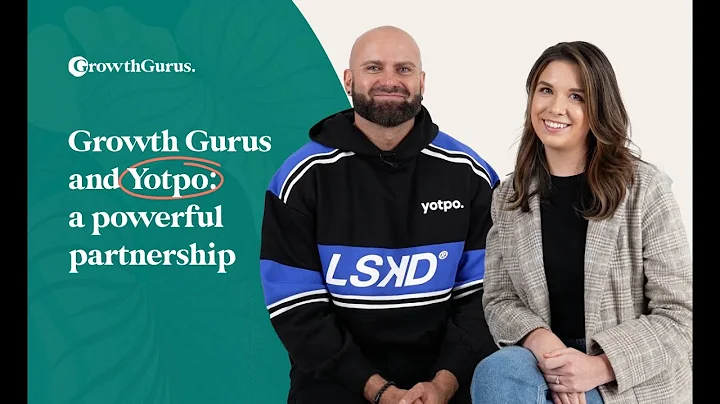Boost Your Ecommerce Store's Organic Traffic with SEO Optimization
Table of Contents
- Introduction
- Understanding Ecommerce SEO
- One Page Optimization
- Off-page Optimization
- Know Your Keywords
- Conduct Keyword Research
- Target Long-tail Keywords
- Optimize Your Website
- On-page Optimization Techniques
- Add Unique and Valuable Content
- Optimize Home Page, Category Pages, and Product Pages
- Utilize Blogging
- Write Relevant and Informative Blog Posts
- Create Listicles and Best Lists
- Interlink Blog Posts with Category Pages
- Build High-Quality Backlinks
- Establish Partnerships
- Sponsor Events and Clubs
- Help a Reporter Out (HARO)
- Consistency and Patience
- Allow Time for Google to Recognize Changes
- Stay Consistent with Your SEO Strategy
- Conclusion
Ecommerce SEO Techniques to Boost Organic Traffic
In the digital age, having a strong online presence is crucial for the success of any ecommerce business. One of the most effective ways to drive organic traffic to your online store is through search engine optimization (SEO). By implementing the right tactics, you can improve your website's visibility on search engine result pages (SERPs) and attract potential customers who are actively searching for your products or services. In this article, we'll discuss some ecommerce SEO techniques that can help you grow your organic traffic and, in turn, increase your revenue.
Introduction
Before delving into the specific SEO techniques, it is important to understand the two main aspects of ecommerce SEO: one-page optimization and off-page optimization. One-page optimization involves creating high-quality and valuable content for your website, including blog posts, product descriptions, and category pages. Off-page optimization, on the other hand, focuses on building links from reputable websites to increase your site's authority in the eyes of search engines.
Understanding Ecommerce SEO
One Page Optimization
Content is king when it comes to SEO. To optimize your website for search engines, you need to create relevant, engaging, and informative content that adds value to your users. This content can be in the form of blog posts, product descriptions, or category pages. However, it is crucial to ensure that your content is of high quality and is optimized with relevant keywords to attract organic traffic.
Off-page Optimization
Off-page optimization, also known as link building, plays a vital role in determining your site's credibility and authority. By acquiring backlinks from reputable websites, such as industry publications or popular online platforms, you can showcase your site's trustworthiness and expertise. The more high-quality backlinks you have, the more likely search engines like Google will recognize your site as reputable and rank it higher on SERPs.
Know Your Keywords
To effectively optimize your online store, it is essential to understand the keywords that people use when searching for products like yours. Conducting keyword research is crucial in identifying the most relevant and high-performing keywords that match your offerings. Tools like Ahrefs' Keyword Explorer can provide insight into the search volume and competition for specific keywords. By focusing on keywords that resonate with your target audience, you can tailor your content strategy to attract valuable organic traffic.
Optimize Your Website
To improve your website's search engine visibility, you must optimize your site's pages for the targeted keywords. This includes optimizing your home page, category pages, and product pages by incorporating relevant keywords into the content, meta tags, headers, and URLs. It is important to provide clear and concise descriptions of your products, ensuring that both search engines and users can understand what your offerings are all about.
Utilize Blogging
In addition to optimizing your main pages, blogging can play a crucial role in driving organic traffic to your ecommerce store. By writing informative blog posts related to your niche, you can establish yourself as an expert in your industry. When creating blog content, focus on popular search queries and topics that your target audience is interested in. By incorporating keywords and internal links to relevant product pages, you can increase the visibility of both your blog posts and your product pages on search engine result pages.
Build High-Quality Backlinks
Building high-quality backlinks is a fundamental aspect of off-page optimization. Partnering with relevant websites, such as marathon associations or running clubs, can provide opportunities to sponsor events or donate products. In return, these partnerships can generate backlinks to your site, signaling to search engines that your website is a trusted authority in your niche. Another effective method is utilizing Help a Reporter Out (HARO) to provide expert insights and get mentioned in articles, which can result in valuable backlinks.
Consistency and Patience
It is important to note that SEO takes time and requires consistency in implementing your strategies. Changes to your website may not yield immediate results, as search engines need time to crawl and index your site. Additionally, it is crucial to stay consistent with your SEO efforts, regularly producing high-quality content, obtaining backlinks from reputable sources, and monitoring your site's performance. With dedication and a well-executed strategy, you can achieve long-term success and steadily increase your organic traffic.
Conclusion
Implementing effective ecommerce SEO techniques can significantly impact your online store's organic traffic and revenue. By optimizing your website's pages, conducting keyword research, leveraging blogging, and building high-quality backlinks, you can improve your site's visibility on search engine result pages. However, it is important to remain patient and consistent, as SEO results take time to manifest. By investing in these techniques and staying dedicated to your SEO strategy, you can achieve sustainable growth for your ecommerce brand.
Highlights:
- Implementing effective ecommerce SEO techniques can significantly impact your online store's organic traffic and revenue.
- One-page optimization involves creating high-quality and valuable content, while off-page optimization focuses on building reputable backlinks.
- Conducting keyword research and targeting relevant keywords is crucial for SEO success.
- Optimizing your website's pages, including the home page, category pages, and product pages, is essential for search engine visibility.
- Blogging can help establish your expertise in the industry and drive organic traffic to your store.
- Building high-quality backlinks from reputable websites can boost your site's authority and search engine rankings.
- Consistency and patience are key in implementing successful SEO strategies.
- SEO is a long-term investment that requires dedication and monitoring to achieve sustainable growth.
FAQ
Q: How long does it take for SEO techniques to show results?
A: SEO is a long-term strategy, and it takes time for search engines to recognize and evaluate the changes. It can typically take several weeks or even months to see noticeable improvements in organic traffic.
Q: Can I optimize my ecommerce store for multiple keywords?
A: Yes, it is possible to optimize your store for multiple keywords. However, it is essential to prioritize and focus on the most relevant and high-converting keywords for your business.
Q: Is blogging necessary for ecommerce SEO?
A: While blogging is not a requirement for ecommerce SEO, it can significantly contribute to increasing organic traffic and establishing your brand's authority in the industry.
Q: How important are backlinks for ecommerce SEO?
A: Backlinks are crucial for off-page optimization and building your website's authority in the eyes of search engines. High-quality backlinks from reputable websites can positively impact your search engine rankings.
Q: Should I hire an SEO agency to optimize my ecommerce store?
A: Hiring an experienced SEO agency can be beneficial, as they have the expertise and resources to implement effective SEO strategies. However, it is important to choose a reputable agency that aligns with your business goals and budget.
Q: Should I optimize my product pages with keyword-rich content?
A: Yes, optimizing your product pages with keyword-rich and informative content can help search engines understand the relevance and value of your offerings. Additionally, it enhances the user experience by providing valuable information to potential customers.






















